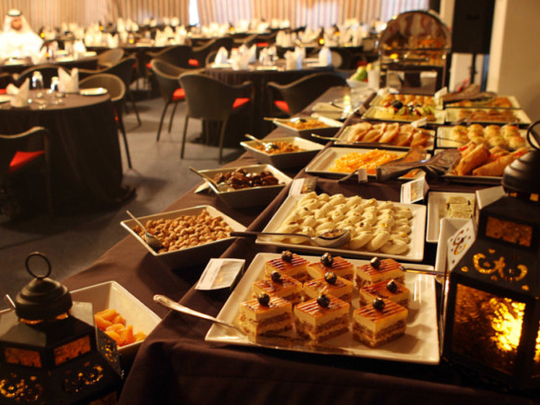
Abu Dhabi: The biggest challenge for diabetics, given the long list of invitations for the evening meal during Ramadan and Eid, is to resist the temptation of overindulging on sweet and fatty foods. But doctors say that diabetics too can enjoy a hearty meal in the company of friends and family if only they know how to eat smart.
“After Ramadan, I find that diabetes and blood sugar levels have worsened in nearly 40 per cent of my patients,” Dr Yousuf Hassan, consultant endocrinologist at Al Noor Hospital Abu Dhabi, told Gulf News.
“But fasting presents a great opportunity to get healthier if patients simply avoid ‘troublemaking foods’ and eat right,” he said.
Fill half your plate with salad, and a quarter portion each of lean meats and complex carbohydrates, and you’re all set, recommended Dr Farhana Lootah, internal medicine specialist at the Imperial College London Diabetes Centre.
And of course, choose fruits to satisfy a sweet tooth.
The UAE has a high prevalence of diabetes, with the condition affecting nearly 19 per cent of the adult population between the ages of 20 and 79 years, and 40 per cent of those over 50 years of age. Uncontrolled blood sugar levels among these patients not only prevents them from fasting but also leads to weight gain, the doctors cautioned.
“Whether you are diabetic or not, the key is always to eat a healthy, balanced diet. When diabetics opt for fried, sugary foods and juices, their bodies become drained of essential fluids and salts. They either end up dehydrated or have to end their fast prematurely, which means they cannot enjoy the benefits of this holy month or enjoy Eid festivities if they are unwell,” Dr Hassan explained.
When one is invited to a buffet meal however, hosts may insist that one eats to one’s fill.
“To make sure you’re not offending anyone, accept the invitation but go ahead and stack your plate with fibrous foods and items that release sugar slowly into the blood, known as foods with glycemic index,” Dr Farhana advised. These include all kinds of fruits, vegetables and wholemeal recipes, items with lots of fibre, apart from bananas, dates, mangoes, grapes, figs, watermelon, potatoes, parsnips, pumpkins and carrots.
It is, however, important to avoid oily salad dressings as well as fruit juices, which are high in sugar content.
Another smart tip is to have some low-fat dairy during a meal, especially laban or youghurt.
“They help in the absorption of fat and sugar and make you feel full quicker,” the doctor explained.
To avoid persistent headaches while fasting, Dr Farhana also said that it is essential to have suhoor, the pre-dawn meal. “Headaches come from low blood sugar and suhoor helps prevent this dip,” she said.
And as always, the magic drink is water, so make sure to get at least two litres of it every day, added Dr Hassan.
He added that these tips to eat smart and healthy are equally useful and beneficial for non-diabetics who want to stay healthy through numerous social gatherings.











